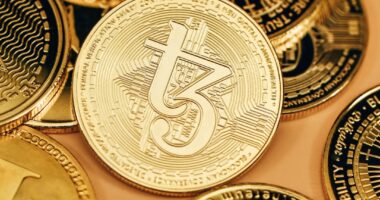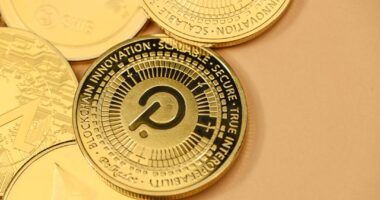Non-fungible tokens (NFTs) are unique digital assets that utilize blockchain technology to verify ownership and authenticity of specific items or content. Unlike fungible cryptocurrencies such as Bitcoin or Ethereum, which can be exchanged on a one-to-one basis, NFTs are distinct and cannot be directly swapped for one another. This uniqueness contributes to their value and attractiveness to collectors and investors.
NFTs can represent various digital assets, including artwork, music, videos, virtual real estate, and social media content. These assets are tokenized on a blockchain, providing a secure and transparent method of proving ownership and authenticity. The art world has seen significant interest in NFTs, with some digital artworks selling for millions of dollars.
This new market for digital art and collectibles has emerged due to the ability to establish ownership and scarcity of digital assets. The gaming industry has also adopted NFTs, allowing players to buy, sell, and trade in-game items as tokens. This development has created opportunities for gamers to monetize their virtual assets and has led to the growth of in-game economies.
NFTs have expanded the possibilities for ownership and monetization of digital assets, fostering a new market that benefits both creators and collectors.
Legal considerations for NFTs
Copyright and Intellectual Property Rights
When an artist sells their digital artwork as an NFT, they are essentially selling the ownership and rights to that artwork. This raises questions about how copyright laws apply to NFTs and whether the original creator retains any rights to the artwork after it has been tokenized and sold. There have been cases of copyright infringement where individuals have tokenized and sold artwork without the permission of the original creator, leading to legal disputes and challenges.
Fraud and Scams
Another legal consideration for NFTs is the potential for fraud and scams. Due to the decentralized nature of blockchain technology, it can be difficult to verify the authenticity of an NFT and the ownership rights associated with it. This has led to instances where individuals have purchased NFTs only to later discover that the seller did not have the rights to sell the digital asset, leading to legal disputes and financial losses.
Regulatory Compliance
Regulatory compliance is also a significant legal consideration for NFTs, especially when it comes to the sale of digital securities as NFTs. The Securities and Exchange Commission (SEC) in the United States has been closely monitoring the NFT market and has issued warnings about the potential for NFTs to be classified as securities. This has led to increased scrutiny and regulation of NFT sales, with sellers having to navigate complex legal requirements to ensure compliance with securities laws.
Are NFTs considered securities?

The question of whether NFTs should be considered securities has been a topic of debate and concern within the NFT community. The classification of NFTs as securities would subject them to strict regulatory requirements and oversight by government agencies such as the SEC in the United States. This could have significant implications for the sale and trade of NFTs, potentially limiting their marketability and increasing legal and compliance costs for sellers.
The Howey Test, which is used to determine whether an asset is considered a security under U.S. law, has been applied to NFTs in some cases. The test considers whether an asset involves an investment of money in a common enterprise with an expectation of profits solely from the efforts of others.
If an NFT meets these criteria, it could be classified as a security, subjecting it to securities laws and regulations. However, there is ongoing debate about whether NFTs should be classified as securities, as they are fundamentally different from traditional investment vehicles such as stocks or bonds. NFTs represent ownership or proof of authenticity of digital assets, rather than an investment in a company or project.
Proponents argue that classifying NFTs as securities would stifle innovation and limit the potential for creators to monetize their digital assets in new and creative ways. Ultimately, the classification of NFTs as securities will likely continue to be a point of contention and regulatory scrutiny as the market for NFTs evolves and matures.
Impact on NFT artists
| Metrics | Impact |
|---|---|
| Sales | Increased revenue from NFT sales |
| Exposure | Increased visibility and recognition in the art world |
| Royalties | Potential for ongoing royalties from secondary sales |
| Community | Opportunity to build a supportive community of collectors and fans |
The rise of NFTs has had a significant impact on artists, providing new opportunities for monetizing their digital artwork and reaching a global audience. NFTs have allowed artists to sell their work directly to collectors without the need for traditional intermediaries such as galleries or auction houses. This has empowered artists to take control of their own sales and distribution channels, potentially increasing their earnings and exposure.
NFTs have also created new possibilities for artists to create interactive and dynamic digital artwork that can be tokenized and sold as unique digital assets. This has led to experimentation with new forms of digital art that push the boundaries of traditional art mediums, blurring the lines between art, technology, and commerce. However, the rise of NFTs has also raised concerns about environmental impact, as the energy consumption associated with blockchain technology used to create and trade NFTs has come under scrutiny.
Some artists have expressed concerns about the environmental impact of minting NFTs and have chosen not to participate in the market as a result. Overall, the impact of NFTs on artists has been both transformative and controversial, providing new opportunities for monetization while also raising important ethical and environmental considerations.
NFT jobs and employment opportunities
The growing popularity of NFTs has created new job opportunities across various industries, including art, technology, finance, and marketing. As the demand for NFTs continues to rise, there is an increasing need for professionals with expertise in blockchain technology, digital art curation, legal compliance, marketing, and sales. One area of employment opportunity is in blockchain development and technology, where professionals with expertise in blockchain architecture, smart contracts, and decentralized finance are in high demand.
These professionals play a crucial role in developing the infrastructure and platforms that support the creation, sale, and trade of NFTs. In addition, there is a growing need for professionals with expertise in digital art curation and management, who can help artists tokenize their work as NFTs and navigate the complexities of the NFT market. This includes roles such as art advisors, curators, and platform managers who can help artists showcase and sell their work as NFTs.
Furthermore, there are opportunities for professionals with expertise in legal compliance and regulatory affairs, who can help navigate the complex legal considerations associated with the sale and trade of NFTs. This includes roles such as legal advisors, compliance officers, and regulatory analysts who can ensure that sellers are operating within the bounds of securities laws and intellectual property rights. Overall, the rise of NFTs has created a diverse range of job opportunities across various industries, providing new avenues for employment and career growth in the rapidly evolving digital economy.
Recent NFT news and developments

Record-Breaking Sales of Digital Artwork
In recent months, the world of NFTs has witnessed several notable developments that have captured public attention. One such development is the sale of digital artwork by prominent artists as NFTs for record-breaking prices. This includes artists such as Beeple, whose digital artwork sold for $69 million at auction, making it one of the most expensive NFT sales to date.
Mainstream Attention and New Entrants
Another significant development is the entry of major brands and celebrities into the NFT market, with companies such as Nike and musicians such as Kings of Leon releasing exclusive digital collectibles as NFTs. This has brought mainstream attention to the world of NFTs and has sparked interest from collectors and investors outside of the traditional art world.
Addressing Environmental and Intellectual Property Concerns
Furthermore, there have been advancements in blockchain technology that aim to address some of the environmental concerns associated with NFTs. This includes the development of more energy-efficient blockchain protocols that aim to reduce the carbon footprint of minting and trading NFTs. Additionally, there have been efforts to address issues related to copyright infringement and intellectual property rights within the NFT market. This includes initiatives to create decentralized platforms that provide greater transparency and verification of ownership rights associated with NFTs.
A Growing Market for Digital Collectibles
Overall, these recent developments highlight the growing interest and investment in NFTs from both established institutions and individual creators alike, signaling a continued evolution of the market for digital collectibles.
Future outlook for NFTs
Looking ahead, the future outlook for NFTs is filled with both excitement and uncertainty as the market continues to evolve and mature. One potential area of growth is in virtual real estate and virtual worlds, where NFTs can represent ownership rights to digital land or virtual assets within online environments. This has the potential to create new opportunities for developers, gamers, and investors to participate in virtual economies powered by blockchain technology.
Another area of potential growth is in the integration of NFTs into social media platforms and online communities. This could enable creators to monetize their content directly through tokenization on social media platforms, creating new revenue streams for influencers and content creators. However, there are also challenges that lie ahead for the future of NFTs, including regulatory scrutiny and environmental concerns that could impact the marketability and adoption of NFTs.
The classification of NFTs as securities by government agencies such as the SEC could lead to increased regulation and compliance costs for sellers, potentially limiting the accessibility of NFT markets. Furthermore, addressing environmental concerns related to blockchain technology used for minting and trading NFTs will be crucial for ensuring the long-term sustainability of the market. Efforts to develop more energy-efficient blockchain protocols and offset carbon emissions associated with NFT transactions will be important for mitigating environmental impact.
Overall, the future outlook for NFTs is one filled with potential for innovation and growth, but also challenges that will need to be addressed in order to ensure the long-term viability of this emerging market. As technology continues to advance and new use cases for NFTs emerge, it is clear that this digital asset class will continue to shape the future of ownership and commerce in the digital age.
If you’re interested in learning more about the legal implications of NFTs and whether they could be considered securities, you should check out the article “Are NFTs Securities?” on NFT-Jobs.com. This article delves into the debate surrounding the classification of NFTs and provides valuable insights into the potential regulatory challenges facing the NFT market. It’s a must-read for anyone looking to understand the legal landscape of NFTs. (source)
FAQs
What are NFTs?
NFTs, or non-fungible tokens, are unique digital assets that represent ownership or proof of authenticity of a specific item or piece of content, such as art, music, videos, or collectibles, on a blockchain.
What is a security?
A security is a financial instrument that holds some type of monetary value and can be traded. Securities can include stocks, bonds, and investment contracts.
Are NFTs considered securities?
The classification of NFTs as securities is a topic of debate and ongoing regulatory discussion. Some argue that certain NFTs may meet the definition of a security under existing laws, while others believe that NFTs are fundamentally different from traditional securities.
How are NFTs regulated in terms of securities laws?
Regulation of NFTs in relation to securities laws varies by jurisdiction. In the United States, the Securities and Exchange Commission (SEC) has indicated that certain NFTs may be considered securities and subject to regulation under existing securities laws.
What factors determine whether an NFT is considered a security?
The determination of whether an NFT is considered a security depends on various factors, including the specific characteristics of the NFT, the manner in which it is marketed and sold, and the expectations of the purchasers regarding potential financial returns.
What are the potential implications of classifying NFTs as securities?
If NFTs are classified as securities, they would be subject to regulatory requirements, such as registration with the appropriate regulatory authorities, disclosure of relevant information to potential buyers, and compliance with investor protection laws. This could impact the NFT market and the way NFTs are bought and sold.





